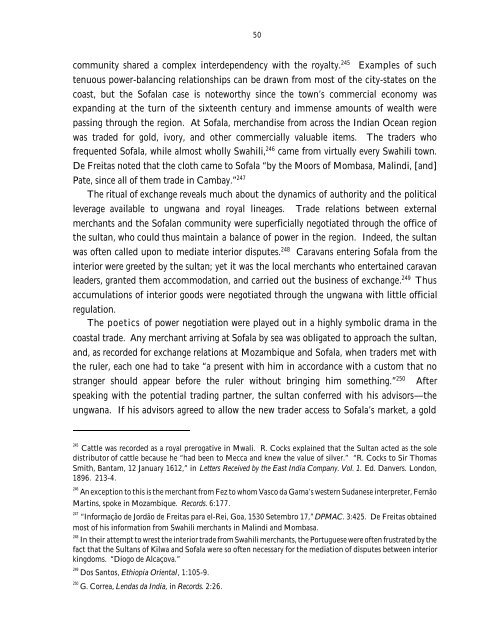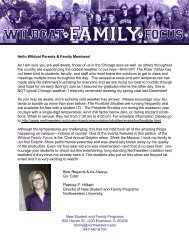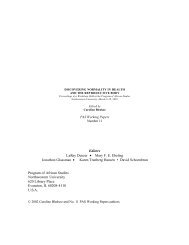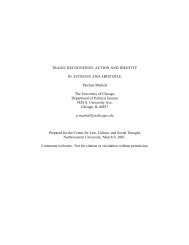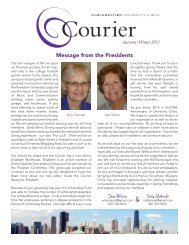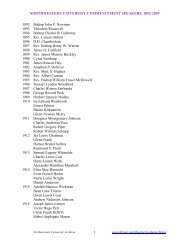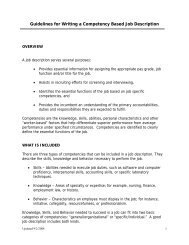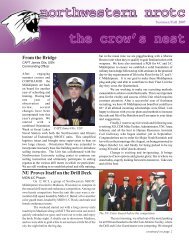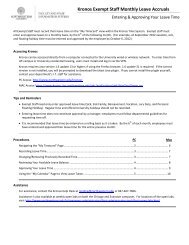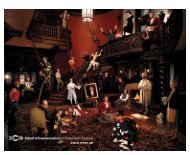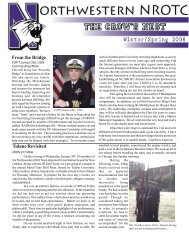Artistry Permits and Custom May Ordain - Northwestern University
Artistry Permits and Custom May Ordain - Northwestern University
Artistry Permits and Custom May Ordain - Northwestern University
Create successful ePaper yourself
Turn your PDF publications into a flip-book with our unique Google optimized e-Paper software.
50<br />
community shared a complex interdependency with the royalty. 245 Examples of such<br />
tenuous power-balancing relationships can be drawn from most of the city-states on the<br />
coast, but the Sofalan case is noteworthy since the town’s commercial economy was<br />
exp<strong>and</strong>ing at the turn of the sixteenth century <strong>and</strong> immense amounts of wealth were<br />
passing through the region. At Sofala, merch<strong>and</strong>ise from across the Indian Ocean region<br />
was traded for gold, ivory, <strong>and</strong> other commercially valuable items. The traders who<br />
frequented Sofala, while almost wholly Swahili, 246 came from virtually every Swahili town.<br />
De Freitas noted that the cloth came to Sofala “by the Moors of Mombasa, Malindi, [<strong>and</strong>]<br />
Pate, since all of them trade in Cambay.” 247<br />
The ritual of exchange reveals much about the dynamics of authority <strong>and</strong> the political<br />
leverage available to ungwana <strong>and</strong> royal lineages. Trade relations between external<br />
merchants <strong>and</strong> the Sofalan community were superficially negotiated through the office of<br />
the sultan, who could thus maintain a balance of power in the region. Indeed, the sultan<br />
was often called upon to mediate interior disputes. 248 Caravans entering Sofala from the<br />
interior were greeted by the sultan; yet it was the local merchants who entertained caravan<br />
leaders, granted them accommodation, <strong>and</strong> carried out the business of exchange. 249 Thus<br />
accumulations of interior goods were negotiated through the ungwana with little official<br />
regulation.<br />
The poetics of power negotiation were played out in a highly symbolic drama in the<br />
coastal trade. Any merchant arriving at Sofala by sea was obligated to approach the sultan,<br />
<strong>and</strong>, as recorded for exchange relations at Mozambique <strong>and</strong> Sofala, when traders met with<br />
the ruler, each one had to take “a present with him in accordance with a custom that no<br />
stranger should appear before the ruler without bringing him something.” 250 After<br />
speaking with the potential trading partner, the sultan conferred with his advisors—the<br />
ungwana. If his advisors agreed to allow the new trader access to Sofala’s market, a gold<br />
245 Cattle was recorded as a royal prerogative in Mwali. R. Cocks explained that the Sultan acted as the sole<br />
distributor of cattle because he “had been to Mecca <strong>and</strong> knew the value of silver.” “R. Cocks to Sir Thomas<br />
Smith, Bantam, 12 January 1612,” in Letters Received by the East India Company. Vol. 1. Ed. Danvers. London,<br />
1896. 213-4.<br />
246 An exception to this is the merchant from Fez to whom Vasco da Gama’s western Sudanese interpreter, Fernão<br />
Martins, spoke in Mozambique. Records. 6:177.<br />
247 “Informação de Jordão de Freitas para el-Rei, Goa, 1530 Setembro 17,” DPMAC. 3:425. De Freitas obtained<br />
most of his information from Swahili merchants in Malindi <strong>and</strong> Mombasa.<br />
248 In their attempt to wrest the interior trade from Swahili merchants, the Portuguese were often frustrated by the<br />
fact that the Sultans of Kilwa <strong>and</strong> Sofala were so often necessary for the mediation of disputes between interior<br />
kingdoms. “Diogo de Alcaçova.”<br />
249 Dos Santos, Ethiopia Oriental, 1:105-9.<br />
250 G. Correa, Lendas da India, in Records. 2:26.


